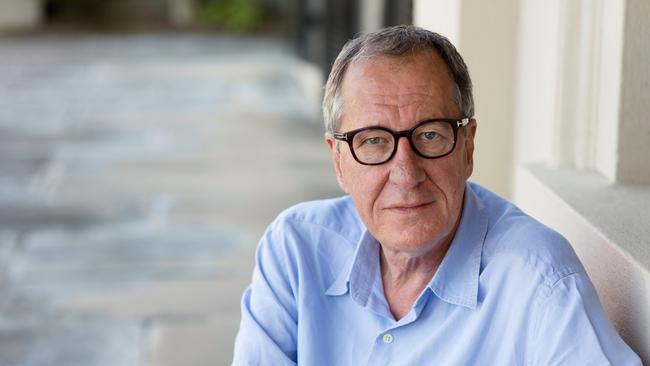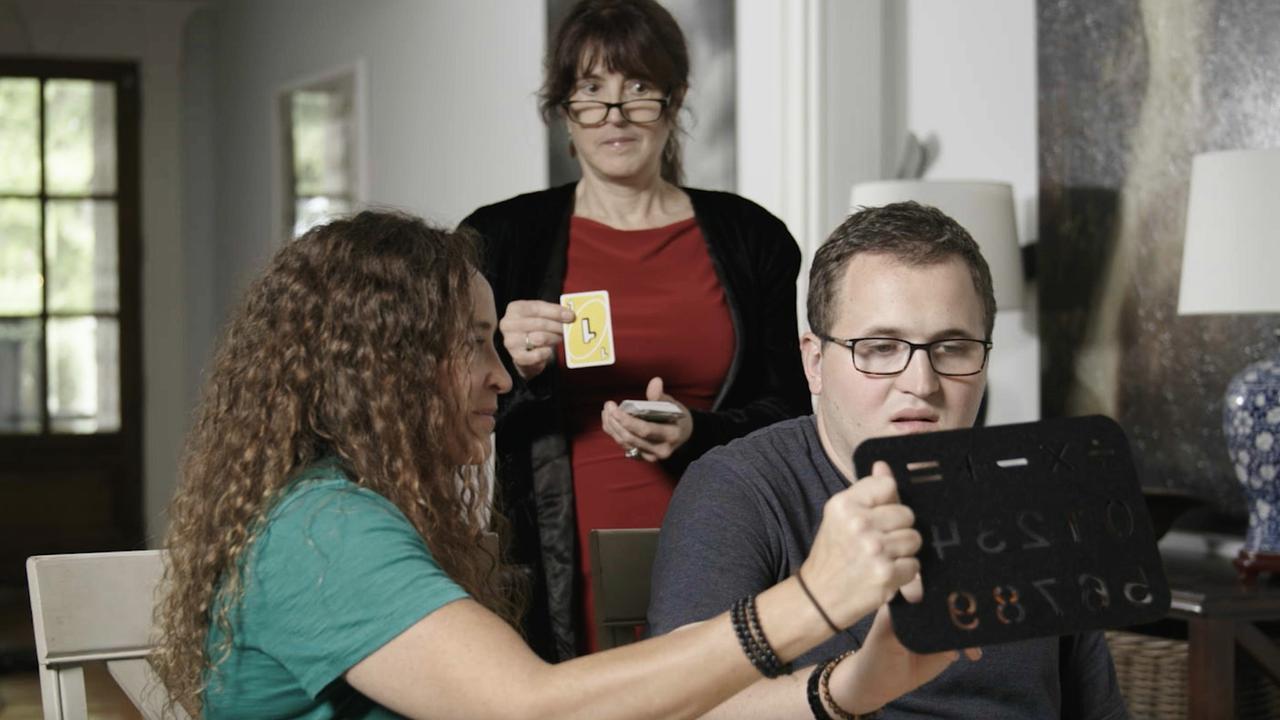Geoffrey Rush: Who Do You Think You Are? takes him back
An Irish hellraiser and a German musician take Geoffrey Rush’s fancy during this journey into his past.

‘I can identify with the uncertain nature of what’s going to come next in the life of a creative person,” the celebrated Geoffrey Rush says, that sadly sonorous voice halting a little. “The artist is always at the mercy of the people in power, the people with money, the people who are dishing out the funds.” He’s talking as the subject of the first episode of the returning SBS series Who Do You think You Are?, the show that takes prominent Australians on an often complex — and sometimes disquieting — genealogical journey.
Rush suggests that somehow the curious vulnerability of his acting life, the way he’s always looking for new dimensions of himself, that quality of perpetual isolation and the sense that the whole world has conspired against his dignity, stems from the DNA that runs deep in his family history. So much of his acting life, he says, has been “moving around every three months, not knowing what you’d be doing in six months, and always having that fear in the back of your mind: ‘Is this when it stops?’ ”
But, as he says when he begins his TV exploration, it’s still what drives him. “A dressing room slut,” he calls himself, someone who loves “the camaraderie of actors, the ensemble feel, the circle of wagons on a film shoot”. It’s a revealing and fascinating insight into what makes great actors tick. Acting is a kind of honeycombed world for Rush; history is its gravity. For an actor like him, the past waits below the surface of the present.
He believes he hails from a long line of farmers, but a patient, elegiac exploration of his heritage in the new series leads to the discovery of a tough and outspoken ancestor fighting for justice in the face of corruption in colonial Australia, and another who was an extravagant musician desperate to succeed in a golden age of high baroque, but was beaten down by professional jealousy.
This new series from Perth-based factual producer Artemis also features other mercurial performers: Toni Collette, David Wenham, Ray Martin, Greig Pickhaver (aka HG Nelson) and comedian Peter Rowsthorn in another chronicle of the social and cultural evolution of our national identity, tracing social patterns, their origins and their interrelations. And the show is presented with Artemis’s usual combination of romanticism and imaginative observational documentary technique.
This is a series that shares the emotional and intellectual rewards that can come with discovering the identity of our ancestors, the participants rather graciously — and humbly in some circumstances, famous though they are — trying to locate their distinctiveness by exploring their unknown family past. And the trick of this truly clever program is the way it convinces us that these sometimes esoteric slices of famous people’s lives have some faint connection with our own, in many cases motivating us to go searching for the biographical mysteries of our own lineage in online genealogy.
The series illustrates, often dramatically and sometimes comically, the way genealogy allows us to personalise the past, and celebrates the way the family — in an era when its importance is meant to be diminishing — is still imperative to most people’s sense of self, that need to feel rooted and connected. Family structures have fragmented but we still care about the kin we come from and the bonds that bind us to relatives and ancestors.
Rush traces his paternal line back to his great-great-grandfather John Thomas Rush, the first of his ancestors to arrive in Australia, knowing nothing of who he was or why he came here. “He’s the glass ceiling to be broken,” Rush muses. He uncovers a convict past, a man who was “a bloody, lying bugger of an Irishman”, according to a relative, soon stamped as a convict of the worst character and sentenced to the notorious Port Macquarie prison, a place for the violent and psychotic. But was he really a troublemaker or a man of principle victimised for speaking out in the vast open prison of NSW, ruled by inept, cruel and corrupt magistrates? (As, often happens in this series, at this point it turns into a nicely elided concentrated history essay on the dark shadow of the convict system.)
Director Russell Vines — an old hand at this series and the maker of the fine documentary feature The Waler: Australia’s Great War Horse — cleverly turns Rush’s investigation into a kind of colonial detective story, with a vengeful Rush, all hollow cheeks and bendy face, striding around ancient courthouses and convict quarters looking for redemption for his forebear, a man who, it turns out, rattled the system.
“I can see in his life something comparable to the profession I’m in,” the actor says, impressed by his determination to survive in the face of uncertainty. “He kind of lived without any sense of a five or 10-year plan; he was dancing with the circumstances as they came up but spoke out when he needed to.”
Rush then travels to the Sunshine Coast to meet his mother, Merle, and sister Rosanne to chase down his artistic roots. Merle, from a long line of German immigrant farmers arriving from Europe in the mid-1800s, possesses the death certificate of her great-grandfather Johann Willms, whose father was a professional musician in Germany.
Rush flies to Hamburg, tracing his musical lineage back to his seven times great-grandfather, another Johann Willms, born around 1680, in the same period as JS Bach, and uncovers a complex story of passion and creativity at the height of the baroque period. It has moments of terrible depression and hardship, overcome only by his ancestor’s determination to take on the complex political machinations of his time. “It’s a bit like time travel, because I didn’t expect we were going back quite so far,” Rush says.
Vines and his director of photography Ulrich-Stephan Krafzik delight in the cinematic possibilities of having the star in their lenses, capturing Rush in the light of northern Europe, the actor moodily posed in mist or walking contemplatively along deserted boulevards. His walk gangly and disconcerting, a tall outline in the gloom, he could be part of some peripatetic troupe such as Moliere’s company, transporting by wagon their commedia costumes and freshly written manuscripts around Europe. Or the Elizabethan players who wandered for months along the Baltic, transporting in huge horse-drawn wagons their rich costumes, armour and even a cage with the head of a decapitated rebel. “It makes me think about the shape of my life,” Rush says in one of the contemplative scenes that make up a part of this show’s elegiac format. “Are there as many others buffeted by circumstance who never got to fulfil themselves?”
He says he finds a sense of identification in the completion of his quest to understand who his two relatives were and how they endured. “They prevailed because of not just accidental indifference to the world around them. They wrote letters to very important people to try and improve their lot. And ultimately they survived.” Like the great actor, his ancestors used the written word to make their mark.
The show presents an interesting and lateral biography of the actor. He’s gracious, intelligent, wry but quietly emotionally guarded, apart from a bizarre taste in floral shirts. It was said of Alec Guinness, an actor Rush admires, that there had never been a successful imitation of him, that he never left enough spare for the public apart from his acting. Rush is like that but impressionists would start with his amazing fingers that thread around objects the way an arachnid raises its legs when cornered.
You sense, like so many fine actors, he’s not entirely comfortable with himself. He’s always appreciated that his saleability is his unpredictability and diversity, but it is more than that. He once told me he idolised those actors of the so-called English school, the Gary Oldmans and the Daniel Day-Lewis style of performer. “Complete actorial transformation” he called what they did. “It is like ventriloquism, Shakespeare is full of it … It’s what’s missing in most contemporary storylines.”
And in this episode it’s fascinating to watch the way, over several weeks, that Rush is able to discover something of what makes him who he is — whoever that really may be.
Who Do You Think You Are?
Tuesday, SBS One, 7.30pm


